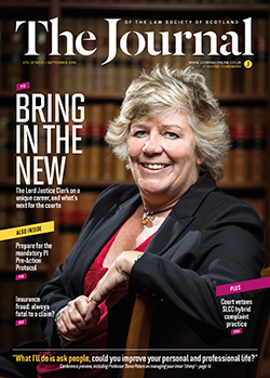Teeth that could be sharper

SSI 2016/215 introduces the compulsory Personal Injury Pre-Action Protocol into the Sheriff Court Rules. In summary, the key points to be aware of are that the protocol applies to:
(i) all personal injury cases with
(ii) a value of up to £25,000, where
(iii) the claimant is represented by a Scottish solicitor, and
(iv) the accident occurred on or after 28 November 2016.
What follows is a protocol setting out how parties are to conduct themselves, with timescales each step of the way. So far, so simple; but as ever the devil is in the detail.
It is difficult to overemphasise the importance of the third of the qualifying criteria: representation by a Scottish solicitor. There is no opt-out clause. Scottish solicitors making a personal injury claim for a client must follow the protocol. The full consequences of failure to do so are not yet clear, but with most claims proceeding on a speculative basis, the biggest impact will be on recoverable fees. For those representing defenders, that will present fertile ground for arguing to reduce their client’s final liability.
It is worth remembering that the conduct of personal injury cases in Scotland remains adversarial both pre- and post-litigation. Settlement through negotiation with the other side is almost universal. Until now, only litigated cases had a referee in the form of the courts, including the recently established All-Scotland Personal Injury Court. Pre-action conduct is a bit of a melee. The Voluntary Pre-Action Protocol (VPAP) introduced in 2006 provided a benchmark for conduct, but it took time for the judiciary to recognise the benefits and accept this as setting the standard.
Model agreement
No doubt as testament to this success, the Scottish Civil Justice Council modelled the new protocol on VPAP. Indeed, the protocol has a clause entitled “Aims of the Protocol”, and these are remarkably similar to those of VPAP. These are to encourage fair, just and timely settlement, along with guiding good practice in relation to disclosure, investigation and the narrowing of disputes. The protocol guides behaviour by setting out strict timescales at every stage of a claim from intimation to the acceptance/rejection of offers. For those used to dealing with VPAP, these timescales will be familiar; for others, there may be a steep learning curve.
Where the two protocols do differ in substance (as opposed to minor quirks like the use of “claimant”, an anglicisation of pursuer) is in terms of compulsion. The VPAP has no parliamentary backing, and parties can opt out with relative impunity. In contrast, where the qualifying criteria are met under the new protocol, “the court will normally expect parties to have complied with the requirements of the Protocol” (emphasis added): OCR, rule 3A.2.
This begs the questions, however: in what circumstances will the new protocol not apply, and what happens when it does not? It may be worth noting that the word “compulsory” does not appear in SSI 2016/215. Therefore, does the protocol actually have any teeth?
Will the protocol bite?
The answer is yes, but its teeth are not as sharp as hoped for. While the aims of the protocol are commendable, there will be cases where Scottish clients are not represented by Scottish solicitors. English solicitors and claims management companies still dabble in the Scottish market. The precise terms of the new protocol and VPAP differ, as do the fees recoverable and the penalties for failing to comply. Scottish solicitors are therefore fighting market forces on an uneven playing field, and when a protocol case falls off the tracks, what recourse is there for poor conduct when sanctions relate only to expenses and only after litigation has commenced?
Poor conduct alone is not a justification for raising proceedings, and the position is even starker for those representing defenders, as they do not have the choice to commence proceedings. Where a party fails (or refuses) to comply but litigation does not follow, there may be little that the opposing party can do. It is perhaps frustrating that poor conduct will remain relatively unpoliced before proceedings are raised, a fact that pays little regard to the prospects of the claimant’s case succeeding.
Where does this take the conduct of pre-action claims in Scotland? As with anything new, questions are raised but no doubt these will be resolved over time, after the dust settles and practitioners, insurers and the courts find their feet. Provided the new protocol is embraced by all, there is no reason it cannot be made to work.
In the meantime, it is worth remembering that every cloud has a silver lining. There are golden nuggets for both claimants and defenders within the new protocol, such as the requirement that admissions of liability are unequivocal and must be worded so as to be binding. Defenders are entitled to seek additional information without fear of immediate litigation. Further, litigation cannot commence until a 14-day period of reflection has elapsed following receipt of an offer. Lastly, there is a near prohibition on the unsavoury practice of making settlement offers without the benefit of medical evidence. All is far from lost.
In this issue
- Beyond the named person service
- Sexual harassment: an everyday problem
- Governing Scotland in a federal United Kingdom
- Losing our judgment? (1)
- Reading for pleasure
- Opinion: Alison Reid
- Book reviews
- Profile
- President's column
- The future, step by step
- People on the move
- Changing face of the courts
- Success: the chimp factor
- Courts reform: a call to pre-action
- Teeth that could be sharper
- Good claims, bad lies
- Unlocking doors: demystifying squatting
- Back to basics
- Brexit and IP: what should solicitors be doing now?
- Agency, insolvency and termination
- Brexit and the agricultural sector
- A carnival for some, but not for others
- Scottish Solicitors' Discipline Tribunal
- Culling of the hybrids
- Common property: what policy?
- Cause of action
- Client balances: reminder issued
- Law reform roundup
- From the Brussels office
- Paralegal pointers
- Your Law Society of Scotland Council Members
- At the doors of the court
- Ask Ash
- To the focused, the medals
- Losing our judgment?
- MacKenzie boosts Society's AML drive






